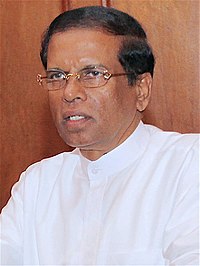COLOMBO, (Reuters) – Sri Lanka President Maithripala Sirisena dissolved the nation’s parliament today with effect from midnight, two sources told Reuters, in a move that will likely worsen an already deep political crisis.
It will mean that new parliamentary elections can be held in January to February, one of the sources, a close ally of the president, told Reuters.
The dissolution comes after an intense power struggle in the past two weeks which followed Sirisena’s sudden sacking of Prime Minister Ranil Wickremesinghe and the appointment of former leader Mahinda Rajapaksa, a pro-China strongman, in his place.
Following the sacking, the president suspended parliament in a move which Wickremesinghe said was intended to prevent the ousted prime minister from contesting the decision in the legislature.

Later Sirisena agreed to reconvene parliament on Nov. 14 but that will now not happen.
Wickremesinghe has refused to vacate the official prime minister’s residence saying he is the prime minister and had a parliamentary majority.
“This is a gross violation of the constitution,” Harsha De Silva, a lawmaker in Wickremesinghe’s party, told Reuters in reference to the dissolution of parliament.
Independent legal experts had told Reuters that parliament could be dissolved only after four-and-half-years from the date of the August 2015 parliament election, either through a referendum, or with the consent of two thirds of lawmakers.
It was not immediately clear how Sirisena can legally dissolve parliament, though his legal experts have said there are provisions for him to do so.
Keheliya Rambukwella, a spokesman for Sirisena’s government, said the president’s coalition has the backing of 105 lawmakers as of Friday, eight short of the parliament majority amid an expected vote of confidence on Nov. 14.
Sirisena has said he fired the prime minister because Wickremesinghe was trying to implement “a new, extreme liberal political concept by giving more priority for foreign policies and neglecting the local people’s sentiment.”
India and Western countries have requested that Sirisena act in line with the constitution while they have raised concerns over Rajapaksa’s close ties with China. Beijing loaned Sri Lanka billions of dollars for infrastructure projects when Rajapaksa was president between 2005-2015, putting the country deep into debt.





